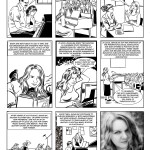Join us for the upcoming meeting of the Psi Book Club on August 13th at 7:30pm (Eastern) as we dive into “DMT Entity Encounters” edited by David Luke & Rory Spowers, with chapters contributed by Ralph Metzner, Chris Bache, Whitley Strieber, Jeffrey Kripal, Angela Voss, Bill Richards, Chris Timmermann, Michael Winkelman, Luis Eduardo Luna, Anton Bilton, Bernard Carr, Daniel Pinchbeck, Dennis McKenna, Ede Frecska, and David Luke. This book offers a captivating exploration of the mysterious entities encountered during DMT experiences. 📅 Date: Tuesday, August 13th 🕢 Time: 7:30pm (Eastern) 📖 Book: “DMT Entity Encounters” edited by David Luke & Rory Spowers Why Attend? This online meeting is open to Supporters and Patrons of Public Parapsychology (event link). Don’t miss this opportunity to explore one of the most fascinating topics in contemporary psychedelic research.

A recent study published in Frontiers in Psychology offers intriguing insights into the cognitive styles of psi researchers compared to skeptics and lay believers in the dynamic field of parapsychology. The study compares the thinking styles of academic researchers who study these phenomena, skeptics who doubt them, and ordinary people who either believe in or doubt such phenomena. Study Objectives The primary goal of the study, conducted by researchers at the Division of Perceptual Studies, Department of Psychiatry and Neurobehavioral Sciences, University of Virginia School of Medicine, was to compare cognitive styles, specifically actively open-minded thinking (AOT) and the need for closure (NFC), among four distinct groups: academic psi researchers, lay psi believers, academic skeptics, and lay skeptics. Understanding these cognitive patterns provides a deeper look into how different groups approach the concept of psi phenomena. Methodology To achieve its objectives, the study involved 144 participants divided into four target groups. Each participant completed self-report questionnaires designed to measure their levels of AOT and NFC, along with their beliefs in psi phenomena. The analysis then focused on identifying significant differences in cognitive styles among these groups. Key Findings The study uncovered several key findings: Implications for Parapsychology These findings hold significant implications for the field of parapsychology. They suggest that researchers’ belief in psi phenomena does not stem from cognitive deficits but rather from a critical, open-minded approach to unconventional evidence. This challenges the stereotype that psi belief is inherently irrational and underscores the value of maintaining a balanced, inquisitive perspective in scientific inquiry. Moving forward, this study opens several avenues for further research. Investigating how cognitive styles influence other areas of parapsychological research or how they evolve over time could provide valuable insights. Conclusion In conclusion, this study bridges the gap between belief and skepticism in parapsychology, highlighting the critical and open-minded nature of psi researchers. By doing so, it paves the way for a more nuanced understanding and acceptance of parapsychological research within the scientific community. Pehlivanova, M., Weiler, M., & Greyson, B. (2024). Cognitive styles and psi: Psi researchers are more similar to skeptics than to lay believers. Frontiers in Psychology, 15, 1398121. https://doi.org/10.3389/fpsyg.2024.1398121

Join us for the upcoming meeting of the Psi Book Club on July 9th at 7:30pm (Eastern) as we dive into “The Science of Channeling” by Helané Wahbeh ND MCR. This session promises to be extra special, as Dr. Wahbeh herself will be joining us to answer your questions! 📅 Date: Tuesday, July 9th 🕢 Time: 7:30pm 📖 Book: “The Science of Channeling” by Helané Wahbeh ND MCR Why Attend? This online meeting is open to Supporters and Patrons of Public Parapsychology (event link). Don’t miss this unique opportunity to explore the science of channeling and engage with a renowned researcher.

College students who feel stigmatized about their paranormal beliefs are more likely to abuse substances such as alcohol, marijuana, and amphetamines. When will science finally normalize such beliefs and experiences?

A study conducted in Ghana provides critical insight into how divination is combined with traditional healthcare services in indigenous communities.








